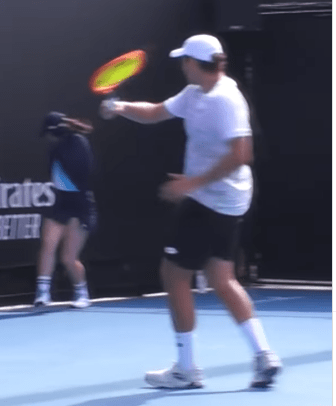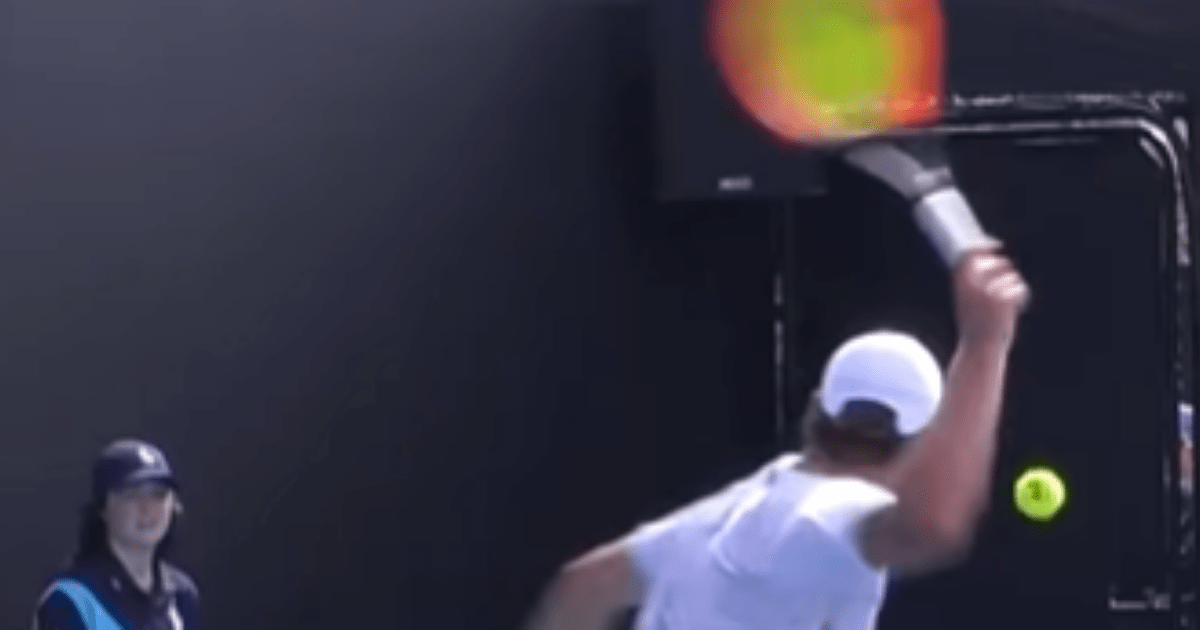A shocking incident unfolded during Pavel Kotov's first round match at the Australian Open, leaving a young ball girl in a state of terror. Despite ultimately winning the match, Kotov's behavior has sparked outrage among fans.
A Disgraceful Act
Kotov, 25, was facing Arthur Rinderknech when he had a match point for a straight sets victory. However, he failed to convert, allowing his French opponent to make a comeback and take the match to a decider.
A Moment of Anger
As frustration mounted, the Russian player unleashed his anger by powerfully smashing a ball into the back fence. This act of aggression left the nearby ball girl cowering in fear, believing she was the target.
Disgust and Outrage
Fans were quick to express their disgust and disappointment at Kotov's behavior. Many called it a disgraceful show of temper and demanded that he face consequences for his actions. They emphasized the importance of respecting ball kids and condemned any behavior that puts them in harm's way.

No Disqualification
Despite the widespread outcry, Kotov was not disqualified from the Australian Open. This decision has further fueled anger among fans, who believe that the tournament should take a stronger stance against such behavior.
A Dramatic Victory
After his outburst, Kotov managed to recompose himself and secure a dramatic fifth-set victory, winning the match 7-5, 6-1, 6-7, 6-7, 6-3. This marked his first-ever Grand Slam victory, a significant milestone in his career.
What's Next for Kotov?
Kotov's journey at the Australian Open continues as he prepares to face either Nicolas Jarry or Flavio Cabolli in the next round. The incident has cast a shadow over his performance, leaving many wondering if he will face any further consequences for his actions.
Frequently Asked Questions
Can someone play tennis late and become a professional player?
Even though it can be more difficult, someone who starts playing tennis later on in life is still able to reach professional status. Success depends on an individual’s athletic abilities, work ethic, commitment, and accessing quality coaching and competitive opportunities. Late starters may need to undergo intensive, focused training. Although the road is more difficult, with talent and persistence, it’s possible to reach a professional level.
What is the best type of fitness for tennis players to do?
Tennis is an intense sport that demands a combination aerobic endurance, anaerobic strength and power, as well as speed. Tennis fitness training involves cardiovascular exercises that improve endurance and strength, plyometrics exercises and explosive movements for speed and power as well as agility exercises designed to improve footwork. Core stability exercises and balance training also play an essential role in building the muscular endurance and coordination necessary for managing the physical demands of the sport.
How important is nutrition to becoming an elite tennis competitor?
Tennis players are not exempt from the importance of nutrition and diet. The right diet supports intense training by providing energy, improving recovery and reducing injury risks. The diet of an elite athlete is typically a mixture of carbohydrates and proteins with vitamins and essential minerals. Hydration is another critical aspect, as maintaining good fluid balance is crucial to prevent fatigue and maintain concentration during play.
How do mental and psychological aspects factor into tennis training?
Mental and psychological preparation is just as important as physical preparation in tennis. The player must be able to control stress, maintain concentration, and manage the emotional highs, and lows, of competition. Visualization, goal-setting and mental rehearsals can be common techniques. A sports psychologist can assist players in building resilience, developing coping strategies to deal with pressure, and elevating their mental game so that it matches their physical prowess.
Is it important to compete in junior events for a tennis career?
It is important to compete in junior tournaments if you want to pursue a career as a professional player. These tournaments offer young athletes the opportunity to prove their abilities against their peers and gain valuable match-experience. They can also learn to deal with the psychological demands that come with competitive play. Junior tournaments are also a great way to prepare for higher-level competitions. They can have a significant impact on a players ranking, their visibility to sponsors and coaches, and even how they develop as a person.
Statistics
- Top tennis players typically train for 4 to 6 hours per day, divided between on-court practice and fitness training.
- Persistent mental training and sports psychology can help reduce performance anxiety by up to 60%, according to sports psychologists working with elite athletes.
- Statistical trends indicate that top tennis players usually have at least 5 people in their support team, including coaches, fitness trainers, and physiotherapists.
- Studies show that superior agility and speed among tennis players can reduce their reaction time by up to 30%, which is crucial during high-level matches.
- On average, it’s estimated that only 1 in 5000 high-level junior tennis players will develop into internationally ranked professionals.
External Links
tenniscompanion.org
myprocoach.net
essentialtennis.com
topendsports.com
itftennis.com
How To
Tennis Equipment Selection for Professional Training
It is important to select the correct tennis equipment for professional training. Firstly, invest in a high-quality racket that complements your play style – whether you’re an aggressive baseliner, a serve-and-volley player, or an all-rounder, your racket should amplify your strengths. Make sure the racket is strung properly and with tension that suits your game. Tennis shoes need to be supportive and stable. They should also fit the surface on which you are most likely to play. To stay comfortable, wear clothing that is breathable and moisture-wicking. Keep your gear organized by using accessories such as dampeners, overgrips, and tennis bags.

